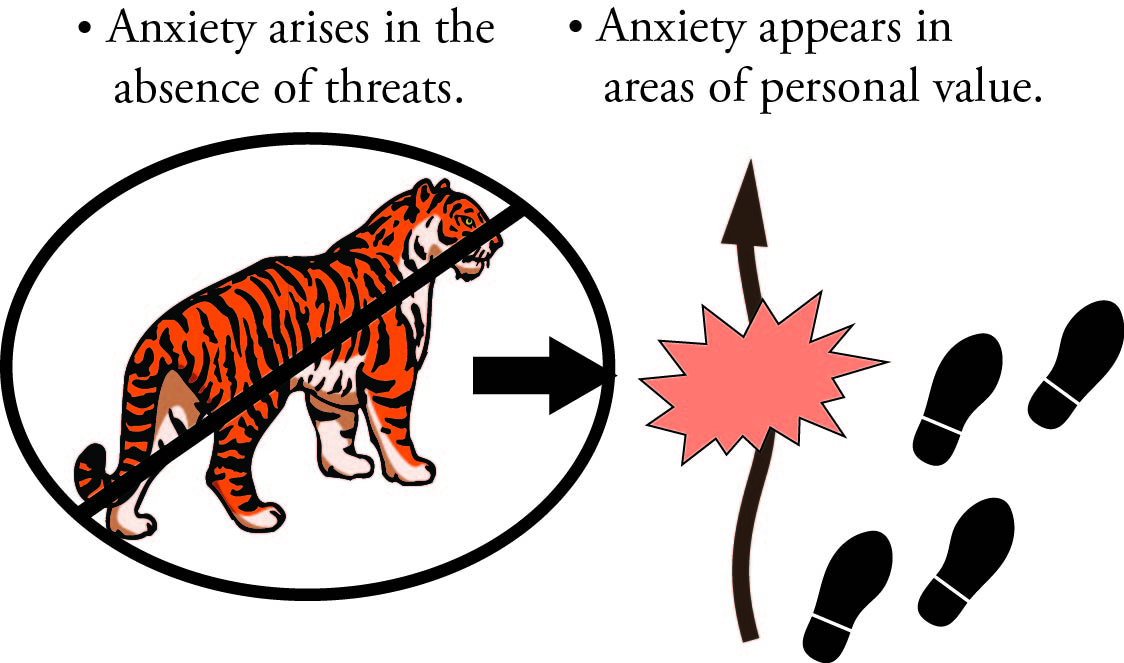A Dilemma is Born: The Short-Circuiting of Avoidance
By now, a logical question has likely made an appearance. If avoiding anxiety is protective, what is so bad about it? Why is avoidance disruptive if it helps us deal with threats (i.e., avoid anxiety = avoid the tiger)?
Because this ancient function has been short-circuited in the modern world.
Avoidance indeed played a critical role in our natural history. We feel anxious, from an evolutionary perspective, when we sense that we are threatened. And we avoid anxiety, from an evolutionary perspective, to escape from threats that evoke it.
For present-day human beings, however, the relationship between anxiety and threats has partially come untethered. We still experience anxiety, of course. But when we feel anxious now, there is often nothing we could or should be doing to defend the things we value.
Most of the time, there are no predators to drive back by building fences. No starvation to ward off by hunting for food. No rivals to repel by sharpening spears. Yet we still feel anxious. We continue to experience anxiety in the absence of actionable threats: threats we could feasibly act upon through our own initiative. We are anxious in the absence of tigers.
Here is the kicker. Anxiety is not just disconnected from threats in contemporary life. It also tends to be connected to areas of personal value.
To clarify, there are occasional times when anxiety seems to appear at random. A strong cup of coffee plus a poor night’s sleep plus a vulnerable moment in the rhythms of our nervous system . . . kaboom! Anxiety makes its entrance.
More often than not, though, anxiety does not operate in this haphazard manner. Anxiety is the feeling that arises when something we value seems threatened. As a result, it is especially likely to emerge in areas of importance, going hand in hand with things that we do not want to lose.
Imagine carrying two bags through a dangerous area: one filled with gold and the other filled with dog poop. If a robber tried to take your belongings, which would you dread losing?
On closer inspection, the connection between anxiety and value makes solid sense. After all, this was evolution’s “plan” from the very beginning. Evolution gave rise to anxiety to help us defend important things, such as our lives themselves, our bonds with others, and our prized possessions. Consequently, it is naturally apt to appear in areas that matter to us most.
Anxiety will surface in our jobs because this is how it works. Anxiety will show up in our relationships because this is what evolution selected it to do. Anxiety does not arise at random, so avoidance does not disrupt our lives at random.
It causes systematic disruption in areas of great importance.
And so a dilemma is born. At some point in the distant past, anxiety avoidance was adaptive (i.e., avoid anxiety = avoid the tiger). But now anxiety
- appears when there are no threats to deal with, and
- tends to accompany areas of personal value.
Our avoidant relationship to anxiety thus no longer serves its intended function on a reliable basis. It once was routinely productive, but now it is counterproductive. It once got us out of a jam, but now it gets us into a jam. It once came with benefits, but now it comes with costs.
Dylan M. Kollman, PhD
dkollman@realanxietysolutions.com







